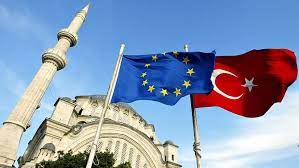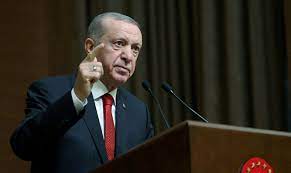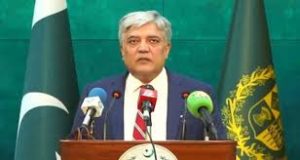Turkiye’s decades-long EU dream faces new challenges

Ankara: The latest Turkiye report of the European Parliament, with its critical tone, infuriated several decision-makers in Ankara.
But the latest statement from President Recep Tayyip Erdogan marks the first official setback from the country’s strategic bid for EU membership in critical times as Turkiye grapples with significant economic challenges and seeks to strengthen its trade relationships with EU member states.
Before his departure to New York on Saturday to attend the 78th UN General Assembly in New York, Erdogan told reporters that Turkiye may unilaterally part ways with the EU if necessary, implying that the country is considering ending its membership bid.

“The EU is making efforts to sever ties with Turkiye,” he said.
“We will evaluate the situation and if needed, we will part ways with the EU.”
The European Parliament’s report, which prompted Erdogan’s response, left no room for ambiguity.
It stressed that any resumption of accession negotiations between the EU and Turkiye hinged upon Turkiye’s implementation of critical democratization reforms.

Moreover, the report recommended that the EU explore “a parallel and realistic framework” for its relations with Turkiye, hinting at a recalibration of their engagement.
Turkiye has been an official candidate to join the EU since 1999, but accession talks have stalled especially over the past five years over the bloc’s concerns about democratic backsliding.
However, during the NATO Summit in Vilnius on July 11-12, Erdogan made it clear that his approval for Sweden’s NATO membership bid would be contingent upon the revival of Turkiye’s EU membership talks.
Erdogan also confirmed that full membership remained a key strategic objective for Turkiye and called for the re-opening of accession talks.

“Although it is not always clear and consistent what Erdogan wants from the EU, it seems that he wants a relationship with no conditionality,” Nilgun Arisan-Eralp, director of the Center for European Union Studies at Ankara-based think tank TEPAV, told Arab News.
“I think he regards Turkiye (as) so powerful — with its presumed geopolitical weight — that no country or intergovernmental or supranational institutional can tell the country what to do,” she said.
“He pretends he is not aware of the membership conditions, especially those pertaining to democracy, rule of law and fundamental rights. Such a relationship can be established between the EU and a third country that might be important for a specific cause — like Tunisia in the case of refugees — but not with a country that can be considered as a candidate,” she added.
Turkiye was not invited to the EU’s recent enlargement meetings, first in the Greek capital Athens on Aug. 21, despite the presence of other candidate countries, and then to the Gymnich foreign ministers’ meeting on Aug. 31 in the Spanish city Toledo — another development that irked policymakers in Ankara and triggered the feeling of exclusion.
“EU could have invited Turkiye to enlargement meetings to discuss the progress or lack of progress together with other candidate countries in a multilateral framework,” said Arisan-Eralp.
“A dialogue could have been initiated with Turkiye in the areas of foreign policy and security in different platforms like the Gymnich meetings,” she said.
What a comprehensive but realistic positive agenda between the EU and Turkiye would look like has now become a matter of debate.
“Given the current circumstances, it would be based on mutually beneficial cooperation areas,” Arisan-Eralp said.
“It might include modernization of the Customs Union, cooperation on a green and digital transition, facilitation of visa procedures and a dialogue on foreign policy,” she said.
The growing trend of rejection of Turkish citizens’ EU visa applications over the past few years has recently prompted the Turkish government to negotiate with the EU to facilitate visa procedures.
Following the recent visit by Oliver Varhelyi, the EU’s commissioner for neighborhood and enlargement, in Ankara on Sept. 5, Turkish Foreign Minister Hakan Fidan said that both parties have agreed to work on visa facilitation for Turkish businessmen and students.
Technical teams are also expected to begin working on the modernization of the Customs Union soon, overdue for an update, as it is limited to industrial goods and processed agricultural products.
Sinan Ulgen, a former Turkish diplomat and chairman of the Istanbul-based Center for Economics and Foreign Policy, thinks that after the elections Erdogan has adopted a positive rhetoric toward the EU and expressed his willingness to revitalize this relationship.
“But the disadvantage is that so far, this has remained at the level of rhetoric,” he told Arab News.
“What really needs to happen is that the Turkish government should essentially create a domestic momentum for political reforms, for improvements in the rule of law, also by addressing the ongoing procedure within the Council of Europe with regards to the non-compliance of the rulings of (the) European Court of Human Rights,” he said.
Yet, the situation is far from one-sided. On the EU side as well, Ulgen said, there are a number of shortcomings.
Currently, the EU seems paralyzed, unable to harness alternative means of interaction with Ankara beyond the long-stalled accession process.
The EU should find ways to engage with Turkiye, Ulgen said.
“Now they are unable to do that and that points to a certain strategic blindness on the side of the EU because there are different channels of engagement with Turkiye above and beyond the stalled accession, like visa liberalization, modernization of the Customs Union, cooperation on renewables, green transition.
“But so far, the EU has been unable to at least try to unblock any of these channels of engagement,” he said.
“Even a little gesture like inviting (the) Turkish minister to (the) Gymnich-style foreign ministers’ (meeting) didn’t happen,” he added.
For the foreseeable future, Ulgen thinks that the accession track will remain stalled in the absence of a strong democracy moment in Turkiye, which he considers a squandered opportunity. After the war in Ukraine, the issue of enlargement has once again become a realistic theme for the EU, where there is an ongoing discussion about how to open the door of accession to countries like Ukraine and Moldova as well as the Western Balkans.
“Turkiye is totally absent from that discussion. Against that backdrop, the EU and Turkiye should at least agree for the near future on some elements of positive agenda, starting by the Customs Union and visa facilitation issue,” he said, implying the urgent need for forging a path toward constructive engagement in the near future.
Turkiye is the EU’s seventh biggest trade partner, while the EU remains Turkiye’s largest merchandise import and export partner.
The bilateral trade volume reached a record $200 billion last year. Technical works to improve trade ties between Turkiye and the EU will begin during Trade Working Group meetings in October.





